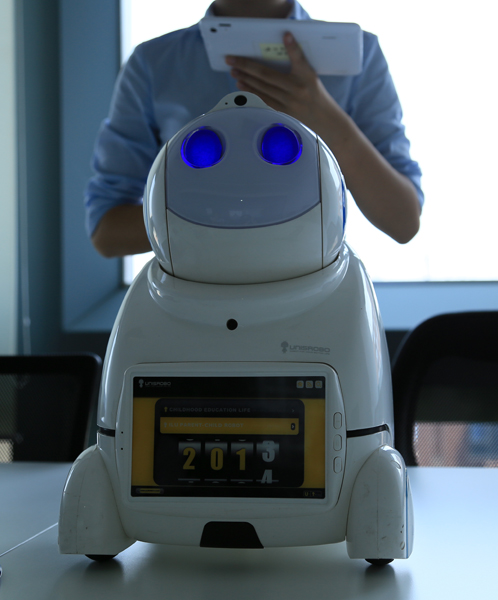Robots for better life
china.org.cn / chinagate.cn, July 30, 2015 Adjust font size:
When the Disney animated film 'Big Hero 6" was released in China last Spring, many Chinese audience were smitten with Baymax, the film's healthcare companion robot, and talked about how they would love to have such a robot as a friend.
 |
|
The robot, called Unisboro or “Xiaoyou,” is made by Beijing Canny Unisboro Technology Co., Ltd and went on sale in 2013. [Photo by Zhang Lulu/China.org.cn] |
That might seem a bit far-fetched; however to insiders of the robot industry in China, it is not a dream at all.
"We do not think that robots like Baymax are a fantasy, but it may be quite unsafe in terms of its building materials (for children)," Yan Peicheng, deputy marketing manager at the Education & Business Division of Beijing Canny Unisboro Technology Co., Ltd., said half-jokingly, during an interview with china.org.cn on July 23.
Robots in the average family
A white robot, with a face resembling a smiling child and a pair of eyes that will turn blue when moving or talking, was brought into a room at the company's Beijing office. "You've held me too tight and it hurts!" the robot grumbled in a cute, childish tone.
The 40cm robot, called Unisboro or known by its more endearing name as "Xiaoyou," is made by Beijing Canny Unisboro Technology Co., Ltd. The company describes it as "China's first family intelligent service robot."
U03, one version of Xiaoyou, is capable of teaching children, taking care of household chores, and monitoring various aspects of daily life, according to the company. With a tablet computer connected to its body and 159 kinds of installed software, the robot can teach children under 12 a number of things including traditional Chinese culture and commonplace knowledge, as well as help them cultivate good habits.
The robot debuted at the Shanghai Expo in 2009, and went on sale in 2013. Few robots can be mass-produced despite tremendous achievements in robotics technology, according to Yan, whose company claims to be the first in China to develop service robots and remains the only one to mass produce them.
"We've seen many cutting-edge robots in laboratories, but they can cost tens of millions of yuan each. Our aim is to build service robots that are affordable to ordinary people and that can really serve people."
A standard U03 costs a maximum of 3,980 yuan (about US$641), roughly half of the monthly salary of a typical Beijing resident.
"For an average family or person, they can buy a service robot for no more than the price of a smart phone." Yan said.
According to Yan, almost 100,000 robota were sold to the end of 2014, including 20,000 specially tailored for customers. More than 90 percent of buyers are people born after 1985, who tend to be more comfortable with the idea of having a robot at home.
Educational and childcare robots are believed to have a massive market in China. A total of 16.87 million children were born in 2014, and that number is expected to increase as the country eases its one-child policy.
New robots on the way
To keep up with the times, the company is developing its own robotics technology. For instance, the U03 robot adopts voice recognition technology while its more advanced version U03S uses semantic recognition -- which, for instance, enables the robot to grasp the meaning of different ways saying hello rather than recognizing only one greeting form.
Certainly, the company wants to go beyond and is not just producing educational robots.
It is set to release a "household manager" robot called U05, with a height of 1.28 meters in November. "The U05 will be the only Chinese service robot that is on a par with foreign counterparts, and we are even better at some particular aspects." Yan said.
For instance, the robot will be able to "read" the surrounding environment and thus move more smoothly.
The company received an investment of more than 50 million yuan (about US$8.05 million) from a major Chinese elevator manufacturer Canny Elevator Co., Ltd in December 2014, which Yan believes will greatly hlep the company move to mass production that is vital to popularize service robots.
The new robot is expected to be seen in business sites such as shopping malls, real estate companies and restaurants in future, Yan said.
He also revealed that the company is in talks with domestic Internet giants to make robots that take advantage of the newest technology, and that it is also studying exoskeleton robots to help disabled people as a means of living up its slogan -- "Robots for your better life."
"We believe that service robot, just like automobiles today, will be indispensable in every household in the future." Yan said.